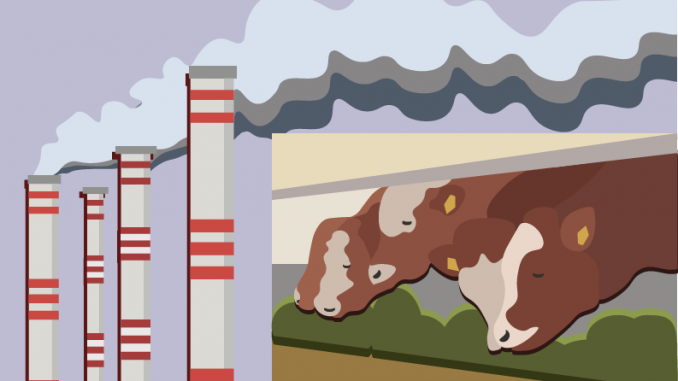
In 2018, the Intergovernmental Panel on Climate Change announced that humans have until 2030 years to keep global temperatures below 1.5 degrees Celsius, which is the threshold before reaching the worst impacts of climate change, CNN reported.
By July 2019, that 12-year timeline went down to 18 months, BBC reported that year. By March of this year, that 18-month deadline became obsolete — the IPCC said in order to curb the most dangerous effects of climate change, significant action needs to be taken immediately, the Guardian reported.
Temple University has made significant strides in sustainability through its 2019 Climate Action Plan, which aims to reduce 100 percent of greenhouse gas emissions by 2050.
But Aramark, Temple’s food service provider, could be doing more to curtail the effects of climate change.
On Jan. 29, students from Temple and Drexel University, along with the National Resources Defense Council, protested Aramark’s lack of commitment to a significant reduction in greenhouse gases outside of their annual shareholders’ meeting in Center City Philadelphia, The Temple News reported.
The group pressured Aramark to commit to a reduction of greenhouse gas emissions by 20 percent by reducing carbon-intensive menu items, like red meat, dairy and eggs.
Since then, Aramark was able to reduce their red meat production by 5 percent in 2019 and is on track for a 12 percent reduction in 2020, wrote Karen Cutler, vice president of communications and public affairs for Aramark, in an email to The Temple News.
That commitment, however, is not enough, and a 20 percent reduction is still possible, said Shanzeh Haque, a campus organizer with NRDC.
“Because the food industry is largely monopolized in the United States and Aramark is a huge player in that, we really think that even if it’s just 20 percent, that could make a huge difference,” Haque said.
Aramark’s failure to take appropriate action is dangerous and will only exacerbate existing climate change. It’s Aramark’s responsibility as the largest U.S.-based food service company to take significant steps toward reducing their carbon footprint to mitigate climate change.
Climate change refers to long-term change in the planet, including rising sea levels, accelerating melting of ice and, most notably, increases in global temperature, according to the National Aeronautics and Space Administration. Ninety-seven percent of climate scientists agree that increases in the planet’s temperature are the result of human emission of greenhouse gases, NASA further reported.
Climate change is likely to lead to extreme heat, rising sea levels, the displacement of vulnerable populations, decreased food production and more — all by the year 2050, CNN reported in June 2019.
A 20 year old today will only be 50 by then, showing that this issue significantly affects young people.
One-fourth of the world’s greenhouse gas emissions come from food production, according to a report by the University of Oxford and the Global Change Data Lab. As one of the leading figures in food service, it’s likely that Aramark contributes heavily to those emissions.
A commitment to reduce emissions could have monumental benefits for Temple, as well. The university’s Climate Action Plan includes goals related to dining, like locally sourcing food and decreasing waste, but the university could commit to a specific reduction in greenhouse gas emissions from food if Aramark makes that commitment.
“Aramark is one of those really big industries that, being students, we can influence them,” said Sean Welch, a junior political science major and an organizer for the Sunrise Movement at Temple, a youth movement to stop climate change. “While I love that Temple has committed to this larger journey toward sustainability, I think it’s also important to push other institutions to that same goal.”
At a university with such an ambitious Climate Action Plan, this commitment by Aramark is incredibly important.
While individuals can take more environmentally sustainable measures themselves, commitments by large corporations would ultimately have more of an impact, said Jessica Harrington, a senior media studies and production major and the president of TU Ecological Eating Club.
Ultimately, the effects of climate change are going to impact us — college students and young people — more than any generation preceding us.
Aramark’s commitment to reducing greenhouse gases would ultimately benefit Temple students, many of which are the consumers of Aramark’s food. It’s essential that Aramark takes steps toward evaluating their greenhouse gas emissions and reducing those immediately.
Every day they waste in doing so will only worsen the situation.



Hey Temple greenies, some day you will grow up and realize your “higher” education has led you astray.